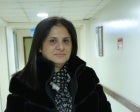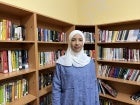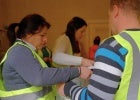Topic
- Gender equality and women’s empowerment (57)
- Economic empowerment (45)
- Conflict, war (37)
- Peacebuilding (32)
- Peace and security (28)
- Ending violence against women and girls (22)
- Crisis response and recovery (20)
- Financial and economic crisis (15)
- Humanitarian action (15)
- Leadership and political participation (15)
- Climate change (12)
- Sexual and reproductive health and rights (12)
- Human rights (11)
- Mediation and conflict resolution (10)
- Peace processes (10)
- Employment (9)
- Post-conflict recovery (9)
- Environmental protection (8)
- Food security (8)
- Women with disabilities (8)
- COVID-19 (7)
- Gender stereotypes (7)
- Green economy (7)
- Civil society (6)
- Access to justice and legal protection (5)
- Anti-violence interventions (5)
- Political empowerment (5)
- Women’s rights (5)
- Gender, culture and society (4)
- Men and boys (masculinity) (4)
- Peacekeeping (4)
- Sexual harassment (4)
- Social protection (4)
- Training (4)
- Goodwill ambassadors (3)
- Health care services (3)
- Sports (3)
- Sustainable Development Goals (SDGs) (3)
- Truth and reconciliation (3)
- Waste management (3)
- Accountability (2)
- Campaigns (2)
- Care and support services (2)
- Civil society participation (2)
- Convention on the Elimination of All Forms of Discrimination against Women (CEDAW) (2)
- Decision-making (2)
- Domestic violence/interpersonal violence (2)
- Entrepreneurship (2)
- Gender data production and collection (2)
- Gender discrimination (2)
- Governance (2)
- Governance and national planning (2)
- Laws, legislation (2)
- Lesbian, gay, bisexual, transgender, intersex (LGBT) rights (2)
- Migration (2)
- Political violence (2)
- Rape/sexual assault (2)
- Reparations (2)
- Rights in marriage (2)
- Rural women (2)
- Safe Cities and Safe Public Spaces (2)
- Shelters (2)
- 2030 Agenda for Sustainable Development (1)
- Access to basic services (1)
- Access to justice post-conflict (1)
- Beijing Platform for Action (1)
- Capacity development (1)
- Citizen engagement (1)
- Constitutions and legal reform (1)
- Disaster risk reduction (1)
- Education (1)
- Energy (1)
- Executive Director (1)
- Financing for gender equality (1)
- Gender data use and accessibility (1)
- Gender equality and inequality (1)
- Gender mainstreaming (1)
- Harmful practices (1)
- Health (1)
- Information and communications technology (ICT) (1)
- Innovation and technology (1)
- Migrant workers (1)
- Parliamentary development (1)
- Poverty (1)
- Primary prevention (1)
- Productive resources (1)
- Public administration (1)
- Public sector reform (1)
- Rule of law (1)
- Service delivery (1)
- UNiTE campaign (1)
- UN Security Council resolution 1325 (1)
- Women’s movements (1)
1 - 20 of 183 Results
Pagination
Date:
Under the PSDP, funded by the Government of Canada, UN Women and the LLWB have supported 26 businesses in signing the WEPs. Two women CEOs, Leila Khalifeh from Gudtolli and Salma Khawla from Bustan Salma, share their insights on how integrating the WEPs into their businesses has contributed to their success.
Date:
On International Women’s Day 2025, the global campaign “For ALL Women and Girls: Rights. Equality. Empowerment”, is calling for action to unlock equal rights, power and opportunities for all. This year’s campaign is particularly significant as it aligns with the 30th anniversary of the Beijing Declaration and Platform for Action, a landmark global commitment to advancing gender equality worldwide.
Date:
In Lebanon, where conflict and displacement have become all too familiar, women have stepped forward—not only as survivors but as frontline responders and decision-makers. They have refused to retreat in the face of danger, choosing instead to stay, fight, and serve their communities.
This International Women’s Day 2025, and through the global theme "For All Women and Girls: Rights. Equality. Empowerment" we honor the strength of all women, and we tell their left behind stories.
Date:
To mark International Women’s Day 2025, UN Women, in collaboration with the Institut des Finances Basil Fuleihan, hosted a high-level panel discussion at the Grand Serail, entitled “Towards Inclusive, Accountable and Gender-Responsive Institutions”. The event examined ways for the public sector to advance gender equality, addressed the challenges in managing public institutions during crises, and showcased women-led initiatives that have influenced policy, strengthened governance processes, and promoted inclusive decision-making.
Date:
Myriam Sfeir is Editor-in-Chief of Al-Raida Magazine, Executive Director of the Arab Institute for Women at the Lebanese American University and a member of the National Steering Committee for the Women’s Peace and Humanitarian Fund in Lebanon. She reflects on her journey to reshape societal structures and empower local organizations to promote gender equality.
Date:
When Mousawat – a Lebanese civil society organization focused on human rights advocacy – began working on an innovative reporting tool to combat sexual harassment in taxis, they knew it had to be shaped by those most affected. To ensure a comprehensive and inclusive approach to the development of the Ishtaki app, Mousawat partnered with the Forum for the Rights of Persons with Disabilities (FRPD) to ensure the active participation of women leaders from various civil society organizations. Among them were 45-year-old Eliana Sassine and 21-year-old Helmiya Al Masri.
Date:
A high-level delegation from the Embassy of the Republic of Korea, led by the Ambassador of the Republic of Korea to Lebanon, H.E. Park IL, and the Commander of the Republic of Korea Battalion (ROKBATT), Col. Yoo Joon Geun, accompanied by the UN Women Representative in Lebanon, Ms. Gielan Elmessiri, visited the Tyre (Sour) district in South Governorate of Lebanon yesterday. The visit underscored the importance of scaling up gender-responsive economic recovery efforts aimed at supporting displaced and returning women to rebuild their lives following the escalation in hostilities as well as the crucial role of women in conflict prevention and promoting sustainable peace.
Date:
Rana Dabliz, a lawyer and human rights advocate, has spent her career championing justice and equality. From her beginnings at the Lebanese University to her impactful role at the Tripoli Bar Association, her journey reflects a steadfast dedication to creating transformative change.
Date:
In the heart of southern Lebanon, where conflict and humanitarian crises have persisted for decades, Dr. Salma Nahle, a 66-year-old pediatrician and emergency physician from Nabatiyeh, has once again found herself at the forefront of conflict. She provided care amid the chaos at the Al-Najda Al-Chaabiya Allubnaniya Hospital in Habbouch. Driven by a profound humanitarian commitment, for her, providing medical care has become a powerful symbol of hope and resilience.
In the words of Mona Abou Zeid: “I will stay, I will endure, and I will fulfil my duties completely”
Date:
Al-Najda Al Chaabiya Hospital has become a lifeline for many. Mona Abou Zeid has served as its Director since 2019. In that time, she has worked tirelessly to uphold her commitment to resilience in the face of numerous challenges, which stem from both the ongoing conflicts in the region and the prevailing social norms of a male-dominated society. She chose to remain at the hospital after the conflict erupted, prioritizing its urgent needs over her own: "I will stay, I will endure, and I will fulfill my duties completely."
Date:
Amid the devastating conflict, Sarah Salloum, a 36-year-old head nurse at the Al-Najda Al Chaabiya Hospital in Habboush, southern Lebanon, transformed her workplace into both a sanctuary for her family and a vital lifeline for the injured.
Date:
A few miles from her town, Kfarroman, on 28 September 2024, 42-year-old mother of two Rana Ghanawi nearly lost her children when a fire broke out in a vehicle in front of her following an airstrike that killed everyone inside. Rana is a social worker with a Master’s degree in Child and Adolescent Psychology and Family Mediation who prepared a study on the needs of returnees for UN Women.
Date:
UN Women welcomed the visit of United Nations Secretary-General António Guterres to Lebanon as a pivotal moment to advocate for gender-responsive reforms in the country’s governance and recovery, reconstruction and reconciliation processes.
The Secretary-General’s visit presents a crucial opportunity to elevate women’s voices in Lebanon’s political landscape, particularly as the new Government takes on the challenges of socio-economic recovery and the enforcement of the 27 November 2024 ceasefire.
Date:
Ghadeer Houmani, President of the Social Work Spirit Association, spoke to UN Women from her office in Nabatieh, where the remnants of shattered glass and broken doors still testify to the horrors experienced in the area. The mother of two with a PhD in Life Leadership is a specialized trainer for numerous social institutions. During the conflict, Ghadeer and her family were displaced to the Jiyeh area. Once the shelling stopped, she was among the first to return, resuming work at her association while following up on what she started in the displacement centres in Jiyeh.
Date:
In Lebanon, women have played key roles during conflicts, crises, and demonstrations, contributing significantly across various fields. Yet, they still face major obstacles that prevent them from fully participating in decision-making and holding leadership positions.
Guided by our firm belief that women are essential partners in promoting peace and establishing a state built on justice, equality, and equal opportunities and drawing on Lebanon’s international commitments, we issue this statement addressed to His Excellency the President of the Lebanese Republic, General Joseph Aoun, acknowledging his dedication to enhancing women’s roles in building resilient national institutions.
Date:
Dedicated to helping vulnerable communities, Rasha Abou Kharoub is a social worker with INITIATE, a UN Women partner organization on a project providing emergency livelihoods and protection for women in South Lebanon, supported by the Austrian Development Agency. She shares her own struggle with displacement amid the recent escalation of the conflict which intensified end of September 2024 and how she has remained strong and committed to her family, community and work.
Date:
Amid the challenges and conflicts that Lebanon has witnessed, stories of women who have made a difference through their initiatives during the recent crisis have emerged. Among them is Rita Barotta, a Professor and a humanitarian activist. Her experience reflects her ongoing struggle to support marginalized women in their communities and encourage them to demand their rights in a society suffering from chaos, crisis and conflict.
Date:
During the recent conflict, countless women have stepped forward as pillars of strength and hope, navigating the challenges with leadership and compassion. From providing food and shelter to displaced families to mediating conflicts within affected communities, these women have taken on critical support roles. Among them is Daad Azzi, who founded the Al-Shouf for Development Association with a group of youth volunteers following the devastating Beirut Port explosion in 2020.
Date:
The Government of the Republic of Korea, through its Ministry of Gender Equality and Family (MOGEF), has partnered with UN Women to address the urgent needs of women displaced and returning to South Lebanon following the year-long hostilities between Israel and Hezbollah. This 1-year initiative aims to provide comprehensive livelihood and protection services to support women and their families in rebuilding their lives.
Date:
The Women Peace Building Network in Lebanon calls for adopting a comprehensive approach to recovery and reconstruction in Lebanon, based on the values of justice, inclusion, and sustainability.
1 - 20 of 183 Results

















